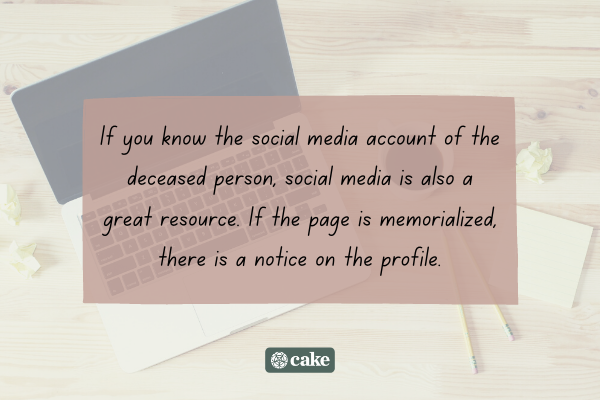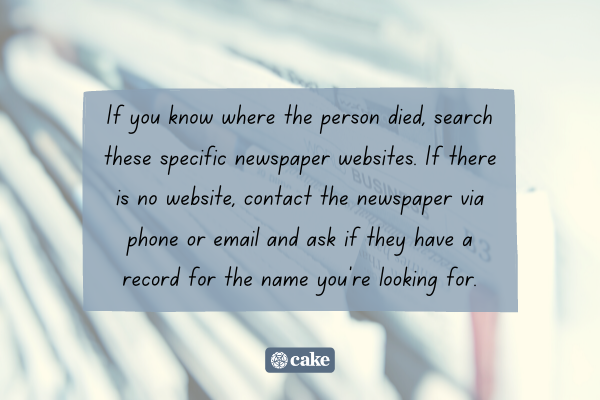how to find out if someone died
If someone isn't a part of your immediate family, it's sometimes tricky to determine if they've passed away. Death is an uncomfortable subject for many people, and bringing it up in conversation isn't always possible. This is even more difficult if you don't know the person personally. So, how do you find out if someone died, especially someone you're not close to?
Jump ahead to these sections:
- 1. Check Online Obituaries
- 2. Search Social Media
- 3. Use a Genealogy or Historical Site
- 4. Look for Government Records
- 5. Search Newspapers
- 6. Visit the Local Courthouse
- 7. Talk to Family Members
- 8. Go to an Archive Facility
- Tips for Finding Out If Someone Died
Luckily, there are several ways to determine if someone has passed away. Most families publish what's known as a death announcement , but there are other ways to learn more about passings. Unfortunately, unless you're able to talk to the family directly, more personal information will likely be hidden.
If you're interested in learning if someone died, here's what to do.
Share your final wishes, just in case.
Create a free Cake end-of-life planning profile and instantly share your health, legal, funeral, and legacy decisions with a loved one.
1. Check Online Obituaries
The first way to see if someone has passed away is by searching for online obituary. An obituary is a written announcement of someone's death. It includes identifiers like family members, accomplishments, and more. In the past, you'd find them in newspapers or other local publications. Nowadays, they're usually posted online.
If you're searching for a famous person, this shouldn't be hard to locate. These obituaries will be published on big news sites and media outlets. There are also specific online obituary websites that exist only as digital memorials .
For the death of an average person, a family member often uses an online obituary publisher to share these death announcements. This is a way to let the broader local community know about a death. So, try to search online for memorial websites—most have a search feature for searching the specific name.
2. Search Social Media

In this day and age, people use social media for everything. It's no surprise they also use social media as a memorial in itself. With social media becoming such a large part of daily life, platforms like Facebook and Instagram are often memorialized for friends and family.
If you know the social media account of the deceased person, social media is also a great resource. If the page is memorialized, there is a notice on the profile. Even if the page isn't memorialized, you'll see friends and family posting memories and other sentiments.
However, this method might not work if the profile is set to private. In this case, you need to be on the individual's friend list. Still, social media is an increasingly popular way to publish a memorial service announcement .
3. Use a Genealogy or Historical Site
While social media and a general online search are great for recent deaths, it likely won't be successful for older deaths. If you're trying to find out when someone died decades or even centuries ago, you need a different approach.
For this, head to a genealogy website or other digital archive. You need data from years past, and this will include an index of burials, cemeteries, and more. You don't need to be a historian to get started.
Here are a few options:
- Genealogy website:The most straightforward way is through a genealogy website. However, these usually charge a subscription fee to use their database. This may or may not be worth it depending on your needs.
- Library website:Many library websites have free databases with historical information. You can also visit in-person for additional research help.
- Historical societies:Historical societies also have their own databases. If your research involves someone who had a prominent role in a community or history, this could be a great choice. Many historical societies have free access to these tools, or you might need to make a small donation.
4. Look for Government Records
You can also check with government records. While not all of these are free and readily available, you might be surprised by what you find. Most governments provide some form of digital access to records as long as you know information about the person who died. Be prepared with as much information as possible, such as their name, where they died, and their date of death.
If they died within the past 50 years, it's more likely that you'll find an online record. If you're searching for an older record, especially in a country outside of the US, it's more challenging to find accurate records. Many countries underwent recent wars or other times of change, and this impacts record-keeping.
To search for government records, search for terms like "death index" or "death records" with the country or state the person was from. This should show you what's available, since the national Social Security death index is only available through third-party sites.
5. Search Newspapers

Because you likely don't have the time or patience to sift through old newspapers physically, do an online search. While social media and online obituary websites have made this less common, many families still only publish memorials through the paper. This might be the only record of death that's publically available.
If you know where the person died, search these specific newspaper websites. If there is no website, contact the newspaper via phone or email and ask if they have a record for the name you're looking for. Most modern newspapers, even smaller publications, have some kind of online search tool.
6. Visit the Local Courthouse
Sometimes online research can only get you so far. In these cases, it's time for hands-on research. One place to start is at the local courthouse in the area where the person died. This courthouse should have records related to the death of the individual.
The probate court has information about wills and testaments. They'll know if the individual had a will or any estate left behind to surviving family.
Again, some courts have online resources. That being said, many don't. The records are less likely to be digital if the person died decades ago, so the best way to learn more is to visit the courthouse in-person. If you're unable to do that, it's also common to call the clerk's office to ask about the individual records.
If they do have the records you're looking for, most courts charge a fee for searching. If you wish for copies made on your behalf, this is also for a charge. Luckily, the fee is usually very minimal. Though it's frustrating to deal with the court system, this is often the most effective way to get the records you're looking for.
7. Talk to Family Members
Another way to find answers about someone's death is to talk to their family members. The family members of the deceased are the most likely to have personal insights into the death. They can answer questions about how the person died, when they died, and so on.
However, some families might not speak in-person about the passing of one of their loved ones. Always be gentle and reasonable when preparing questions. Learn more about the best sympathy messages to offer after losing a loved one. Avoid intruding into family matters. Still, many people are open to talking about those who passed on as long as you don't overwhelm them.
If you don't already know who the deceased person's relatives are, try to connect with them over social media. Making a simple introduction first makes the entire situation easier. They might be willing to meet with you in-person or digitally.
8. Go to an Archive Facility
Finally, another in-person option is to go to an archive facility. Every country, state, and some cities have their own archive facility. These are a place for storing public records, historical information, and other first-hand documents. These may or may not be digitized, so going in-person is more effective.
Start your search by checking for the archive website. If you're unable to find what you're looking for, visiting yourself is the best option. These are typically free facilities, and there are researchers available to help you.
Archive facilities are not likely to have information about recent deaths. They're a much better fit for older, historical deaths. If you're doing ancestry research, for example, this is a great resource.
Tips for Finding Out If Someone Died
Before you begin your search, make sure you're aware of a few things. As mentioned before, death is a difficult topic. It might not always be easy to find what you're looking for, especially if you don't have a personal relationship with the deceased.
Keep these tips in mind:
- Be respectful:The biggest thing to keep in mind is respect. Always be respectful of those who passed on, their families, and their right to privacy. Knowing what to say when someone dies is an important part of the process.
- Reason for death: While information about when a person died might be publically available, you don't have access to how this individual died. This is something the family would need to share with you.
- Consider a premium service: If you want results quickly, the fastest way to learn is by paying for a subscription to an online search service.
Start Your Own Search
Facing a death is always hard, even if you don't know the person personally. Conducting your own research helps you find the closure you need around the passing. If you're unsure when they died or whether or not they even passed, it's time to start your own search.
Luckily, using the methods above, there are many tools to use to aid your search. Do you want to know whether someone died? Look to the internet and the best in-person resources for help finding the data you need.
how to find out if someone died
Source: https://www.joincake.com/blog/how-to-find-out-if-someone-died/
Posted by: vegafallsocring.blogspot.com

0 Response to "how to find out if someone died"
Post a Comment